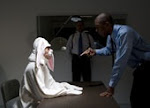Wednesday, February 3, 2010
Burning Love
The story ends like this.
He was dead.
She, his wife, was the accused.
And for good reason. Being, she did it.
At first, they thought it was the fire that killed him while he slept on his back, in bed.
That's because, in the beginning, no one knew about the green antifreeze she mixed with green Gatorade and green Jello she fed him while his stomach grew increasingly upset. The antifreeze alone should have killed him, but it didn't.
The autopsy revealed the smoke hit his lungs, so he evidently was alive when he breathed in the smoke. It was the smoke that finally shut down all systems.
It was the fire that sealed the deal.
Why he remained prone in his bed when the smoke came, was another puzzle solved post mortem.
He'd been injected with a drug usually found only in surgical units because it's almost exclusively used in surgical procedures. It causes a slow body paralysis without affecting consciousness.
She, his wife, was a nurse who worked in the surgical unit at the nearby hospital.
She was at work when the fire started.
To others at work, the first she heard of the fire was when she was called at the hospital and told her house was engulfed in flames.
When she arrived at the house, she told the police to look in the garage for her husband's car. If the car was there, she said, he was home. She told firemen he'd been home sick earlier, maybe he left to get some medicine.
His car was in the garage.
The firemen eventually found the husband, still in bed, literally burnt to a crisp... his gold fillings and gold rings laying where they should be, body parts turned to ashes.
She played her part to a tee. While no one witnessed actual tears, there were moans, groans and whines of despair. Still there were crucial errors.
Killing him was her first mistake.
Willingly coming to police headquarters without counsel for an interview was her second.
First thing the police asked was whether she left work the day of her husbands death.
"No" she replied, without hesitation. She'd answered the question before.
Everyone believed her story... until a security camera in the hospital lobby, one outside the front door and one in the parking lot, showed her coming and going.
The little trip, which she denied taking during the taped police interview, took just enough time for a quick stop home and back to the hospital where she worked.
When the police showed her the footage of her leaving the hospital, she "suddenly" remembered she had to leave the hospital to move her cart to change parking spaces.
Then the police asked if when she left the hospital, did she go home?
She said, no, she moved the car, that's all.
That's when the police told her a witness across the street from her house saw her car enter her home's driveway and saw her exit the car, enter the house, and exit, then drive away rather quickly, just a few minutes later.
This neighbor sighting was about the same time she left the hospital, the police told her.
That's the thing about lies.
You tell one,...just one... and it starts a tiny ball rolling that grows bigger and bigger until it trips you up in your own deception.
If the small town the allegedly grieving woman lived in had pillars, she was certainly was one of those pillars until this happened. Noble nurse, devoted mother, loyal wife.
She went all the way to trial believing her saintlike stature in her small town community would outweigh the evidence.
Not so.
It's said "people with nothing to hide hide nothing."
The inverse is also true.
People with something to hide, hide everything.
So they talk more to prove their innocence by weaving what they believe is a credible web of lies. They say more, they act out more, they reveal more in an effort to convince you they know nothing.
And inevitably, if there is an affair there, it will be found... in text messages, on computer hard-drives, or cell records; on motel registers, in pants pockets or in witness sightings.
She, said grieving widow, was having a full blown fling with a co-worker prior to the fire and death.
Ultimately it all comes out in the wash... or in the courtroom.
In her case, it was the latter.
She was convicted and given a life sentence instead of the death sentence she gave her husband.
And the family of the dead husband filed a civil suit against the nurse.
Unfortunately, there was nothing left to collect.
Between the time of the killing and time she was convicted, she'd received and spent nearly 500k in insurance money. What didn't go to her defense attorneys, went up her nose.
Today she rots in a prison cell for life.
All appeals have failed.
All hope is gone.
Yet still, she denies her guilt.
Evidently, for psychopaths, killing is far easier than telling the truth.
He was dead.
She, his wife, was the accused.
And for good reason. Being, she did it.
At first, they thought it was the fire that killed him while he slept on his back, in bed.
That's because, in the beginning, no one knew about the green antifreeze she mixed with green Gatorade and green Jello she fed him while his stomach grew increasingly upset. The antifreeze alone should have killed him, but it didn't.
The autopsy revealed the smoke hit his lungs, so he evidently was alive when he breathed in the smoke. It was the smoke that finally shut down all systems.
It was the fire that sealed the deal.
Why he remained prone in his bed when the smoke came, was another puzzle solved post mortem.
He'd been injected with a drug usually found only in surgical units because it's almost exclusively used in surgical procedures. It causes a slow body paralysis without affecting consciousness.
She, his wife, was a nurse who worked in the surgical unit at the nearby hospital.
She was at work when the fire started.
To others at work, the first she heard of the fire was when she was called at the hospital and told her house was engulfed in flames.
When she arrived at the house, she told the police to look in the garage for her husband's car. If the car was there, she said, he was home. She told firemen he'd been home sick earlier, maybe he left to get some medicine.
His car was in the garage.
The firemen eventually found the husband, still in bed, literally burnt to a crisp... his gold fillings and gold rings laying where they should be, body parts turned to ashes.
She played her part to a tee. While no one witnessed actual tears, there were moans, groans and whines of despair. Still there were crucial errors.
Killing him was her first mistake.
Willingly coming to police headquarters without counsel for an interview was her second.
First thing the police asked was whether she left work the day of her husbands death.
"No" she replied, without hesitation. She'd answered the question before.
Everyone believed her story... until a security camera in the hospital lobby, one outside the front door and one in the parking lot, showed her coming and going.
The little trip, which she denied taking during the taped police interview, took just enough time for a quick stop home and back to the hospital where she worked.
When the police showed her the footage of her leaving the hospital, she "suddenly" remembered she had to leave the hospital to move her cart to change parking spaces.
Then the police asked if when she left the hospital, did she go home?
She said, no, she moved the car, that's all.
That's when the police told her a witness across the street from her house saw her car enter her home's driveway and saw her exit the car, enter the house, and exit, then drive away rather quickly, just a few minutes later.
This neighbor sighting was about the same time she left the hospital, the police told her.
That's the thing about lies.
You tell one,...just one... and it starts a tiny ball rolling that grows bigger and bigger until it trips you up in your own deception.
If the small town the allegedly grieving woman lived in had pillars, she was certainly was one of those pillars until this happened. Noble nurse, devoted mother, loyal wife.
She went all the way to trial believing her saintlike stature in her small town community would outweigh the evidence.
Not so.
It's said "people with nothing to hide hide nothing."
The inverse is also true.
People with something to hide, hide everything.
So they talk more to prove their innocence by weaving what they believe is a credible web of lies. They say more, they act out more, they reveal more in an effort to convince you they know nothing.
And inevitably, if there is an affair there, it will be found... in text messages, on computer hard-drives, or cell records; on motel registers, in pants pockets or in witness sightings.
She, said grieving widow, was having a full blown fling with a co-worker prior to the fire and death.
Ultimately it all comes out in the wash... or in the courtroom.
In her case, it was the latter.
She was convicted and given a life sentence instead of the death sentence she gave her husband.
And the family of the dead husband filed a civil suit against the nurse.
Unfortunately, there was nothing left to collect.
Between the time of the killing and time she was convicted, she'd received and spent nearly 500k in insurance money. What didn't go to her defense attorneys, went up her nose.
Today she rots in a prison cell for life.
All appeals have failed.
All hope is gone.
Yet still, she denies her guilt.
Evidently, for psychopaths, killing is far easier than telling the truth.
Subscribe to:
Post Comments (Atom)







No comments:
Post a Comment